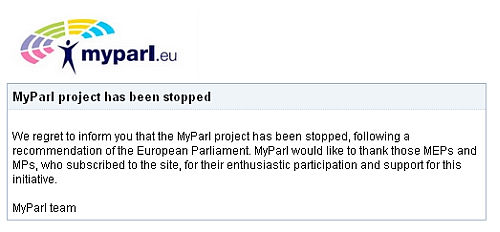Archive for December, 2008
 |
29. December 2008 – 16:37 by Rolf Luehrs
|
For those of you interested in the intersection of politics and Internet 2009 will be a good year – probably.
At least the political agenda looks promising. First of all we will see whether Barack Obama manages to integrate his huge online supporter community somehow in his political work. However this will turn out, he has already changed the relation between politicians, voters and the way elections will be won. As Dan Jellinek put it:
It really does feel like a breakthrough for those of us who have watched internet campaigning since it began. Because the amount of money raised online, combined with the huge volume of genuine discussion, campaigning and messaging that took place using new technologies, was on a scale so much larger than anything we have seen before that it seems undeniable that the era of internet campaigning has now definitely – and permanently arrived.
There is, however, a difference between campaigning and participation. And I doubt that Europe will catch up with what Obama did – although there will be some opportunities to demonstrate that the involvement of voters and citizens is not limited to the U.S.
First to mention are the 2009 EU Parliamentary Elections. There are already some interesting projects running to fight political apathy and to let the European citizens have their say, like e.g. the Eurpean Citizens’ Consultations. Another project targeting especially at young voters is the blog competition Think about it:
A dynamic community of bloggers, journalists and journalism students, a forum alive with debate and discussion, a creative portal to inspire youth involvement with the 2009 Parliamentary Elections, brought to you by the European Journalism Centre (EJC).
The goal is to get Europeans to THINK ABOUT IT and to express their views on Europe through an online blogging competition. The invited bloggers will cover, report, critique and debate on campaign issues and candidates. EJC editors will give feedback on the journalistic standards of the blog posts.
Opportunities to use the Internet for citizens’ involvement will not only show up on the European level but also on the national or regional level, i.e. in Germany. In the “Super Wahljahr 2009” eight Local Government Elections (Kommunalwahlen), five Regional Elections (Landtagswahlen), the National Parliamentary Elections (Bundestagswahl) and the election of Germany’s Federal President will take place.
One politician already showed his ability and willingness to learn from Barack Obama: Thorsten Schäfer-Gümbel! Never heard of him? Well, this will change… Mr. Schäfer-Gümpel is the social democrat’s premier candidate for the Landtagswahl in Hesse. He started with a considerable handicap: Nobody knew him before his candidature and he had only two months to get known and loved by the voters. The reason he got in this miserable situation was that Andrea Ypsilanti, the boss of the regional Social Democratic Party, tried to inaugurate herself as premier with the backing of the left party – something she said she never would do before the election. After the election has produced a tie between the two main parties, she changed her mind – with fatal consequences (”A mess in Hesse”, as The Economist titled). On the eve of her coronation four deputies of the SPD refused to vote for her, so that new elections became necessary.

Mashup of Schaefer-Gümbel’s campaign by PPP Read the rest of this entry »
Posted in News, Projects, Trends | 2 Comments »
 |
24. December 2008 – 15:57 by Francesco Molinari
|
Government effectiveness is key - says a recent report from Deutsche Bank Research - to enhance people’s satisfaction about the quality of their lives. For most EU countries, allowing citizens more control over their own lives seems advisable and possible, and people should demand and practise this.
The main message of the new study, entitled “The broad basis of societal progress: freedom, trust, tolerance, education, and much more” - which is also available online (pdf) - can be summarised as follows:
a) All the main development theories trying to go beyond per capita GDP as a measure of societal progress tend to use the same explanatory variables - from education to innovation, from tolerance to freedom etc. - to give an assessment of a country’s level of achievement;
b) Statistical indicators of those same variables were highly correlated with each other across a sample of 20 OECD countries in 2005. Particularly high was the relationship between life satisfaction, tertiary education, government effectiveness and (low) corruption.
c) Looking at the countries evolution over time, it can be seen that performing better is actually possible. In spite of the different starting points, there is always room for sustainable change - especially if and when a large number of actors and a wide variety of actions are involved. State and local government, citizens and businesses, all of them could and should contribute to “making capitalism happier” in Europe and in the whole world.
d) In particular, Governments’ role is to foster trust and cooperation among people, letting them free to do more and better for their own well-being and the progress of society.
In these dismal times of global crisis, an evidence-based set of recommendations, pretty much in the Christmas spirit, comes out of a leading socio-economic research. Greetings to all PEP-NET members!
Posted in Trends, Visions | No Comments »
 |
23. December 2008 – 12:57 by Evika
|
According to the recently published Communication from the Commission to the European Parliament, the Council, the European Economic and Social Committee and the Committee of the Regions “Towards an accessible information society”(1.12.2008) eAccessibility and Web accessibility in particular have emerged as a high societal priority due to the growing importance of the Internet and the explosive growth in online information and interactive services, namely online banking, shopping, government and public services, and electronic communication with distant relatives and friends.
ICT-enabled government, participation and democracy can contribute to the objectives of inclusion in a variety of ways: by providing new ICT-enabled channels for delivering government services and making these services more accessible for people with special needs (eServices eAccessibility); making the democratic p process and governmental decision making more transparent, consultative and participatory through online information provision in all relevant languages and formats, deliberative initiatives and empowerment of advocacy groups that serve at-risk groups (eEngagement), and, by harnessing the same tools in a targeted fashion to make inclusion policies and initiatives themselves more transparent, participatory and accountable and by stepping up the provision of content relevant to groups at risk of exclusion.
Participation within an inclusive governance model is possible only if political, economic, technological and social barriers are removed and access to these opportunities is equitably distributed. Easy access to (ICT) is a prerequisite for participation. Facilitating this access entails, inter alia, removing barriers, making ICT tools easier for everyone to use, and encouraging people to use them by raising awareness of their economic and social benefits.
Progress in this area remains fragmented and slow, despite such targets and many actions involving public authorities, industry and civil society. Accessibility of public websites remains stuck at 5%. Only 10% of people aged over 64 are Internet users while the average in Europe is 47%. Without further intervention, the gap will only be halved in 2015 instead of 2010. The latest assessments conducted for the Commission show that accessibility of websites, communication terminals, TV sets and other ICT remains problematic, with lower-educated, economically inactive and elderly people at the greatest risk of being left behind.
Posted in Visions | No Comments »
 |
17. December 2008 – 11:55 by Zebralog / Hans Hagedorn
|
It was planned as a “political MySpace”: MyParl.eu should have been a networking site for Members of the European Parliament (MEPs) and Members of the national parliaments (MPs), a virtual space to connect and share information and opinion. The project, financed with about 4 mio. Euro was first announced in May, a launch-party was scheduled for October. And until the beginning of October, everything seemed to go fine. So, a few days ago, I was very surprised when I tried to take a look at the site and was welcomed by a mere sign reading “We regret to inform you that the MyParl project has been stopped, following a recommendation of the European Parliament.” That sounded like a serious change of mind. What has happened?

Read the rest of this entry »
Posted in Projects | 4 Comments »
 |
16. December 2008 – 13:51 by Involve
|
Are online forums dominated by techies and geeks and, if so, does this deter wider citizen participation?
The European Citizens’ Consultation 2009 (ECC09) might provide an interesting case study. ECC09 is an ambitious project which is seeking the views of the citizens of Europe on the economic and social future of the EU. The overarching aim is to involve citizens of EU member states in discussion on its economic and social future, bringing citizens closer to Europes institutions and creating the space for citizen voices in the European policy making process. Involve are not-for-profit participation specialists and are the UK National Partner for the ECC09 project.
The project has three main stages
(1) the online stage
(2) the National Consultation
(3) the European Citizens’ Summit.
Stages (2) and (3) are both offline featuring face-to-face deliberation between randomly selected citizens. The online stage (1) on the other hand is open to all citizens, MEPs, pressure groups and NGOs and requires participants to be self-selecting.
At Involve, we are interested to see who will take part in the online discussion and at what stage in the project they do so. While in-depth knowledge of European issues is not a prerequisite for joining the discussion, the citizens posting in the first instance have tended to polarise debate, limiting discussion to single issues with strongly pro-Europe or Eurosceptics slant. Will this stimulate wider discussion in the long term or will the dominance of geeks create a barrier to “lay” citizens to joining the debate? A number of MEPs have contributed their visions for the economic and social future of Europe which are easily accessible for people not schooled in the mechanics of the EU and it will be interesting to see whether the Party political dimension of MEP contributions will stimulate citizens, who are otherwise not motivated by techie talk, to contribute their own ideas about the future of Europe. The online debate runs throughout the duration of the project. You can view and join the debate at www.european-citizens-consultation.org.uk
For more info contact laurie@involve.org.uk
Posted in Uncategorized | 3 Comments »
 |
11. December 2008 – 15:47 by Bengt Feil
|
2008 definitely was a great year for everybody involved in social media and the web in general as for example new forms of communication developed (micro-messaging), online video content went mainstream (Hulu) and the largest and most successful online campaign helped to make Barrack Obama into the oval office. But what will 2009 bring to for the citizens of the net? Will it again be another “great” year or will the financial crush and other problems also effect web and it inhabitants? Fast Company posted a great article compiling the predictions for 2009 of eight persons who have different insights into the field. Four main trends can be identified from their statements:
1.) The personal profile on the web will become portable
Chris Brogan of New Marketing Labs thinks that social networks will start to merge and that data portability (e.g. the possibility for users to synchronize their data between platforms) will take off. Mary Hodder (Founder of Dabble.com) also thinks that user will be able to unify their online presence. But she also thinks Facebook will have trouble to compete with others in an open environment as they are they best example of a “walled garden”. From my point of view this prediction seems reasonable taking into account the ideas represented in Facebook Connect, Friend connect and Open Social.
Read the rest of this entry »
Posted in Trends | 4 Comments »
 |
9. December 2008 – 17:28 by Julia Glidden
|
My colleagues at 21c and I have just returned from a fascinating trip to the Kingdom of Lesotho - a small landlocked country surrounded by South Africa. The purpose of the visit was to conduct a workshop on local democracy with government officials and to launch a landmark study on the implementation of local democracy in Lesotho.
Whilst I had never been to Lesotho before I did lecture in South Africa for many years, and had the tremendous opportunity to help lead an eGovernment Study Tour to the UK for Lesothan Ministers a little over a year ago. I am fairly well traveled, and do my best to stay on top of world trends in our field….. So there is very little excuse for me to have found myself surprised by reality on the ground - yet I must confess that I was. Read the rest of this entry »
Posted in Uncategorized | 1 Comment »
 |
9. December 2008 – 17:16 by Rolf Luehrs
|

Most of you are familiar with the concept of RSS-Feeds, which enable you to collect/check new content of different websites without visiting them.
All you have to do is to put the feed’s web address (URL) in your feed reader. There are lots of different RSS reader available either as plug-in for your browser (Firefox, MS Explorer etc.) or web based like e.g. google reader.
Beyond the readers there are lots of different feed aggregators, allowing you to display and remix different RSS feeds on one or more screens. One example is netvibes. Other services allow you to build a community around the feeds, where members can additionally rate the feeds, comment on it, or post messages, like e.g. friendfeed. Read the rest of this entry »
Posted in Uncategorized | 3 Comments »
 |
9. December 2008 – 11:01 by Bengt Feil
|
There is no doubt that the large majority of internet users would agree that there has to be some sort of action against the proliferation of illegal content on the internet. The question is how this could be achieved without harming innocent and productive use of the web. In 2004 British Telecom in the United Kingdom went live with Cleanfeed, a content filtering system which targets material related to child sexual abuse identified by the Internet Watch Foundation. All other UK Internet Service Providers agreed on implementing a version of this system till the end of 2007. BoingBoing has posted a flowchart describing how Cleanfeed works in detail. The widespread use of this system since 2008 recently has produced its first major controversy:
The Cleanfeed system identified a certain picture on Wikipedia.org (an album cover by the band Scorpions) as being content related to child sexual abuse. The system is set up to block such content by blocking the IP address of the server providing the content for all costumers who use an ISP who has Cleanfeed implemented (which should be all UK ISPs by now). Wikipedia on the other hand provides one IP address to all persons who want to edit any article on the site. The result is that all costumers of UK ISPs are now unable to edit Wikipedia which “breaks” the purpose and a major function of the site. No internet user in the UK could for example start writing an article about this controversy on the Wikipedia.
This example shows the problems of widespread and general purpose filtering of internet content at the ISP level:
Read the rest of this entry »
Posted in Trends | 7 Comments »
 |
7. December 2008 – 16:19 by Rolf Luehrs
|
The European Commission supports eParticpation with lots of different instruments and we are grateful that PEP-NET is among the funded projects. One of the main objectives of our network is, as you may know, to connect the scattered fragments of the eParticipation community or even to help establishing something worth to be called a community.
This is very easy said but much harder done as I experienced the other day. I discovered that the eParticipation scene is more fragmented and relevant information are far more distributed than I expected. And I have to admit that I lost my way in the Commission’s eParticipation jungle.

What has happened? Well, my trip started last week reading Simone’s PEP-NET post about Debate Europe, a project which I stumbled upon a few times without paying to much attention to it. Read the rest of this entry »
Posted in Projects | 3 Comments »










